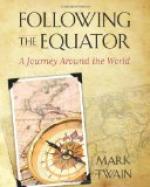and broken and unclean shirtfront. Showy studs,
of imitation gold—they had made black disks
on the linen. Oversized sleeve buttons of imitation
gold, the copper base showing through. Ponderous
watch-chain of imitation gold. I judge that
he couldn’t tell the time by it, for he asked
Smythe what time it was, once. He wore a coat
which had been gay when it was young; 5-o’clock-tea-trousers
of a light tint, and marvelously soiled; yellow mustache
with a dashing upward whirl at the ends; foxy shoes,
imitation patent leather. He was a novelty—an
imitation dude. He would have been a real one
if he could have afforded it. But he was satisfied
with himself. You could see it in his expression,
and in all his attitudes and movements. He was
living in a dude dreamland where all his squalid shams
were genuine, and himself a sincerity. It disarmed
criticism, it mollified spite, to see him so enjoy
his imitation languors, and arts, and airs, and his
studied daintinesses of gesture and misbegotten refinements.
It was plain to me that he was imagining himself
the Prince of Wales, and was doing everything the
way he thought the Prince would do it. For bringing
his four valises aboard and stowing them in the nettings,
he gave his porter four cents, and lightly apologized
for the smallness of the gratuity —just
with the condescendingest little royal air in the world.
He stretched himself out on the front seat and rested
his pomatum-cake on the middle arm, and stuck his
feet out of the window, and began to pose as the Prince
and work his dreams and languors for exhibition; and
he would indolently watch the blue films curling up
from his cigarette, and inhale the stench, and look
so grateful; and would flip the ash away with the
daintiest gesture, unintentionally displaying his brass
ring in the most intentional way; why, it was as good
as being in Marlborough House itself to see him do
it so like.
There was other scenery in the trip. That of
the Hawksbury river, in the National Park region,
fine—extraordinarily fine, with spacious
views of stream and lake imposingly framed in woody
hills; and every now and then the noblest groupings
of mountains, and the most enchanting rearrangements
of the water effects. Further along, green flats,
thinly covered with gum forests, with here and there
the huts and cabins of small farmers engaged in raising
children. Still further along, arid stretches,
lifeless and melancholy. Then Newcastle, a rushing
town, capital of the rich coal regions. Approaching
Scone, wide farming and grazing levels, with pretty
frequent glimpses of a troublesome plant—a
particularly devilish little prickly pear, daily damned
in the orisons of the agriculturist; imported by a
lady of sentiment, and contributed gratis to the colony.
Blazing hot, all day.
December 20. Back to Sydney. Blazing hot
again. From the newspaper, and from the map,
I have made a collection of curious names of Australasian
towns, with the idea of making a poem out of them:




